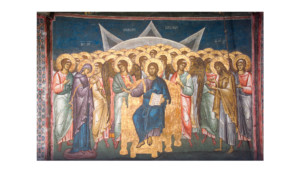‘…and will come again in glory to judge the living and the dead… ’

‘…Men of Galilee, why do you stand gazing up into heaven? This same Jesus, who was taken up from you into heaven, will so come in like manner as you saw Him go into heaven’. (Acts 1:11)
It is no coincidence that the icon of the Ascension portrays Christ in a manner which suggests He is both ascending and descending, in line with the above words spoken by the Angels to the Disciples at the Ascension.
Christ Himself proclaimed that He would ‘come again in glory’ and described the events that would surround His Coming, as the Gospels of Matthew, Mark and Luke recount in similar detail. ‘When the Son of Man comes in His glory, and all the holy angels with Him, then He will sit on the throne of His glory. All the nations will be gathered before Him, and He will separate them one from another, as a shepherd divides his sheep from the goats’ (Mt. 25:31- 32; see also Mk. 13:26, Lk. 21:27).
Christ’s second Coming will be very different to His first, as He will come with great power and glory, meaning all will see Him and all will recognise Him. The answer to the question of when Christ will come is not given. For, as Christ Himself emphasised, of importance is not the time, but that it will happen. Hence, His repeated exhortations on the need for spiritual vigilance – ‘Take heed, watch and pray; for you do not know when the time is’ (Mk. 13:33).
Christ as the Son of God is characterised not only by love, but also by justice or righteousness. He is the only ‘righteous Judge’ (2 Tim. 4:8); the ‘one Lawgiver who is able to save and to destroy’ (James 4:12). The hymns and prayers of our liturgical services constantly remind us of our need for God’s divine mercy which always accompanies His divine judgement: ‘Do not enter into judgement with Your servant, for no one living shall become justified in Your sight’ (Ps. 142:2).
Fortunately divine judgement does not function according to the rules of human justice. God’s judgement or righteousness is not to be interpreted in a judicial, legalistic manner where punishment and reward dominate. Rather, He attributes to each of us, that of which we are worthy and that which we have cultivated ourselves to receive. In actual fact, each of us is judged by our own works, actions, words and thoughts. These provide the basis ‘for a good defence before the awesome judgement seat of Christ’, which we pray for at every Divine Liturgy.
When Christ comes again, every soul will rise to meet judgement. Christ says ‘…for the hour is coming in which all who are in the graves will hear His voice and come forth – those who have done good, to the resurrection of life, and those who have done evil, to the resurrection of condemnation’ (Jn. 5:28-29).
The Creed presents the event of Christ’s second Coming in a light that is jubilant and triumphant. He has promised each one of us: ‘…I will come again and receive you to Myself; that where I am, there you may be also’ (Jn. 14:3). May this promise fill our heart with hope, consolation, and the fervent desire to respond with the joyful cry: ‘… come, Lord Jesus!’ (Rev. 22:20)
In the next issue of ‘Our Creed’, we will focus on the phrase ‘…and His kingdom will have no end’
Source: Lychnos April 2022 /May 2022
